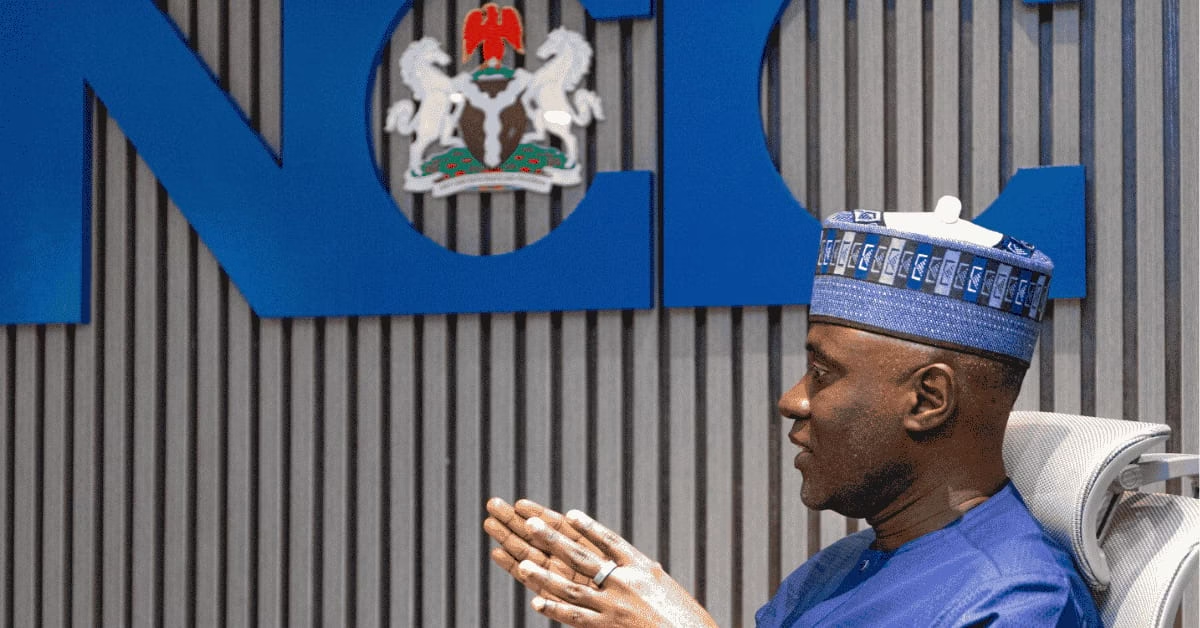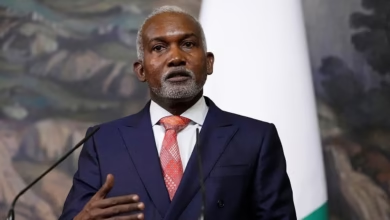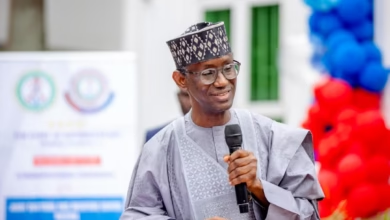
It is public knowledge that Dr. Aminu Maida has been in the saddle at the Nigerian Communication Commission (NCC) for nearly two years, but it looks like he is finally set to clear the augean stable, which many Nigerians liken the country’s telecommunications industry to.
Buoyed by the recent announcement of a new NCC board headed by Mr. Idris Olorunnimbe, Maida has, of late, being taking steps to leave no doubt about his readiness to ensure that Nigeria’s 170 million plus telephone subscribers have real value for their money.
At a recent media interaction, the NCC Executive Vice Chairman made it clear that it was indeed a good time to review existing guidelines on regulations because of new developments in the industry compared to the early 2000s.
He also gave his words on transparency and corporate governance which according to him is necessary to strengthen the industry.
”We make rules, whether in terms of regulations, directives, guidelines, and we enforce. So if you don’t follow, there’s some kind of punitive measure, whether it’s to withdraw regulatory services, apply financial sanctions, suspension of license, etc.
“But you have to admit that in today’s information age, because at that time we were regulating voice connections and text messages, but now the idea of the internet is about information.
”From tariff adjustments, to the recent launch of the corporate governance guidelines, the presidential order on CNI, settlement of USSD debts dispute, and migration to the end-user billing, we have put in place various simplification initiatives, like the tariff simplification, and our transparency initiatives, like the major outage notification portal”, he asserted.
Clearly, the EVC is not oblivious of trending issues in the industry but he is also convinced that competition among the operators would go a long way in strengthening the telecommunications sector.
Driving Competition
One of the ways the NCC on Maida’s watch intends to drive competitiveness among Telecom operators is the strategy of information disclosure.
What this presupposes is that the regulator gleans information from operators on their services which would then be used to rank them with the outcome made public. “So we need to let Nigerians know all our operators, who is first, second, and third. The person who came last will be in trouble with his board. He will have to go and explain to his board.
“Or it will be an opportunity for him to tell his board, I need that investment that you have been denying me. So that is our intention. The rules and enforcement will still be there.But we want to complement it with an information disclosure approach as well to drive that competitiveness. So that is why you’ve seen us increasingly releasing information taking the bold step to make corrections to some of our data points, whether it is the population.” Maida noted.
So for the NCC EVC, driving competition among the operators will literally forced them to invest more in equipment that will improve quality of service.
Also interesting is the plan by the commission to release, before the end of the year, a public map of network performance which according to the EVC is based on aggregate information from end users.
This is an independent data that will give clearer insight into which of the operators is lagging behind in the area of performance.
Addressing subscriber complaints
And speaking of quality of telecommunications services, there have been hues and cries from the citizenry which have not escaped the notice of the regulators, and which many observers have long insisted that NCC must attend attend especially the issue of data depletion.
This was why the commission on Maida’s watch had to engage some of the best audit firms in the land to take a deep look at the allegations and what did they find.
Hear Maida: “We directed the Mobile Network Operators (MNOs) to engage Tier 1 audit firms last year and we also made it a two-year requirement and we were specific, Tier 1 so the big boys, the PWCs, KPMGs, people who play in that league.
”So we audited their systems. The results came back and showed that there were no major issues. Nobody was actually draining your data and short changing”.
Which is why the NCC EVC has decided to work on some theories which have forced him to look at th complaints from a different perspective.
”So there were two theories we had or hypotheses we have. Very strong hypotheses. One, the tariff structure itself is confusing. You buy a bundle or you subscribe to a particular tariff but the way it is described telling you buy this or spend 20 Naira you’ll get an additional 10 Naira who will understand what they are brought.
”So what we did is we issued a guideline for simplification and we gave them a template whereby everybody, you can go and do your marketing to attract your customers but you must disclose your tariffs in this unified template.
”And we also limited the number of promotions and add-ons that you can have. So that is very simple so that people can understand. Now, compliance is not 100% yet but we’re working on the compliance because we also have to change a lot of things but we believe that simplicity and transparency again are part of our information disclosure approach,” he added.
Perhaps what may be the EVC’s biggest challenge is his quest for corporate governance in the entire industry. In his words, he envisages an industry with wholly-owned Nigerian companies listed on the Nigerian Stock Exchange.
He believes that good corporate governance translates to transparency and readily cites the example of the Dangote Group to buttress his position.
According to him, many Nigerians would readily invest in companies they are sure have good governance structure from board to the management.
”I’d like to see one that was birthed in Nigeria, owned by Nigerians, thriving on the stock exchange, like Dangote. Dangote today offers shares for sale. People rush to buy. it’s because we trust Dangote. He’s running his businesses in a transparent and professional manner. And given the criticality of this industry, we need to also imbibe and institutionalize that professionalism,” Maida argued.
He also raised a series of posers, “Would you rather put your money in a company where you don’t know how they spend it, there is no accounts, you don’t know who sits on the board, how long their tenure is, or a company who you can just go to their website, you’ll see their reports, you will see all their policies, their interventions, their CSR. Would you rather go there?
”And it’s the same with investors. So corporate governance for us, we see it as a very, strong tool to also, as part of our information disclosure and transparency approach to this industry. It’s going to be uncomfortable in the short term for some of our local players that need to adjust.”
This is a clear indication of what the NCC is set to do in due course which is why it recently rolled out the 2025 Guidelines on Corporate Governance for the communications industry, to replace the one that has been in place since 2016.
The goal is to ensure ethical practices, boost investors confidence and protect consumers and it looks like the key highlight is the separation of the roles of Chairman and CEO which at least one of the operators vested in one individual.
This is certain to be a litmus test for Maida in his quest to clean the augean stable in Nigeria’s Telecoms industry.
Dapo Okubanjo, a journalist and public affairs analyst writes from Abuja.





